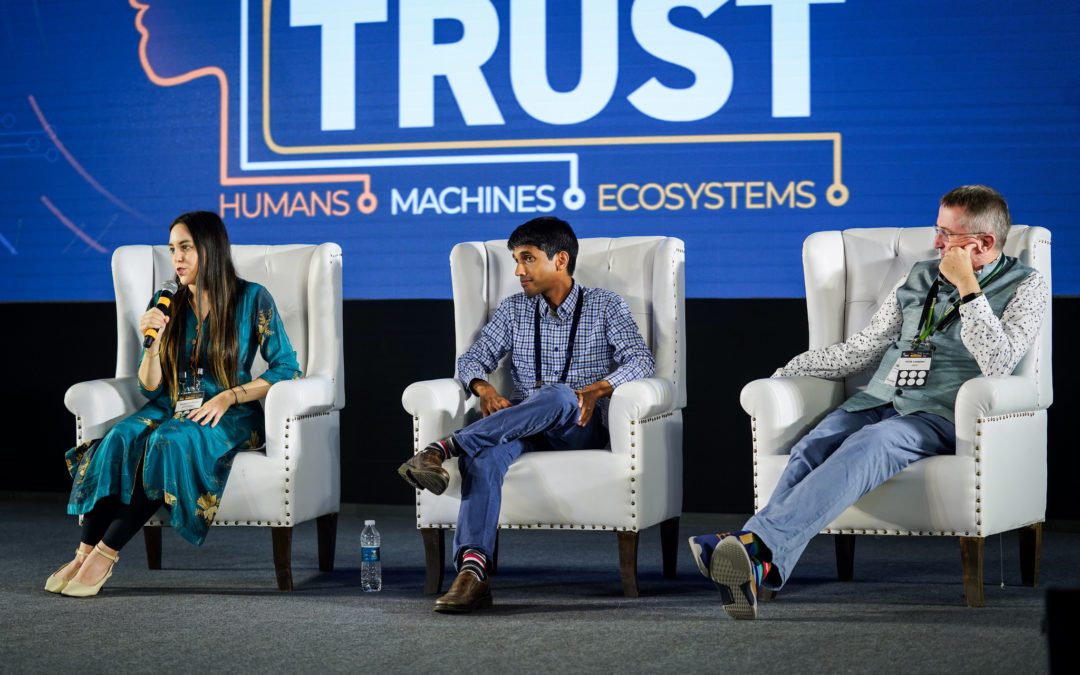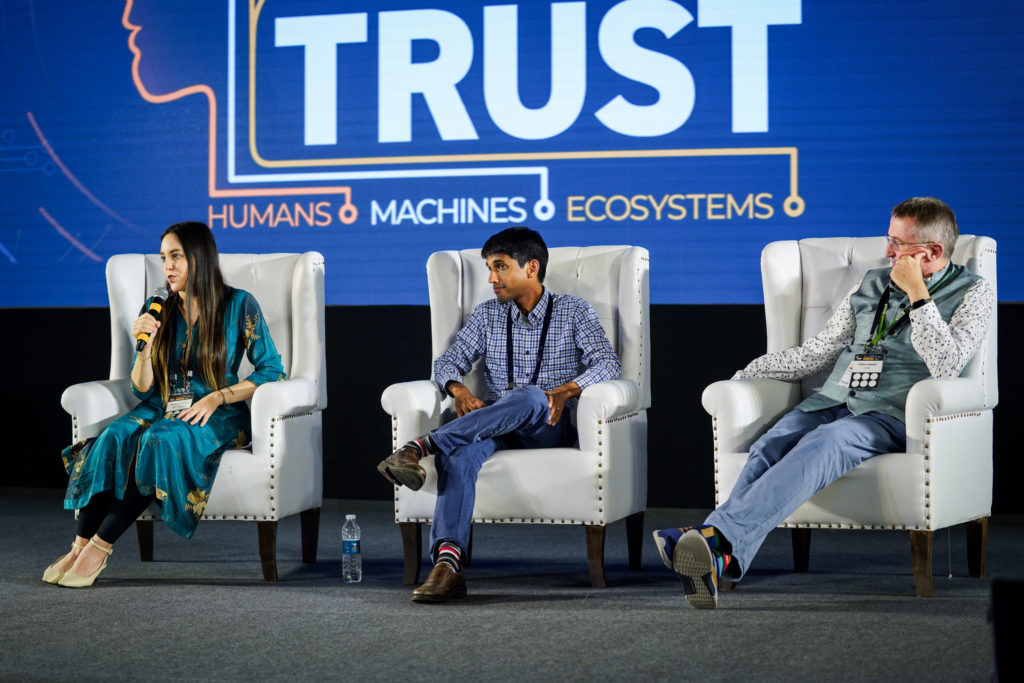Platform Coordinator Brian King on our 2019 Convention takeaways
High-level takeaways from the 2019 Big Data in Agriculture Convention held in Hyderabad, India, 16-18 October.
Governments, firms, and the media are less trusted today than they were ten years ago, and in the last few years digital tools and technologies appear to be accelerating this global erosion of trust. We have seen large-scale state surveillance programs unveiled, confirmation that human biases are encoded in algorithmic systems, and massive commercialization of user data leading to breaches in consumer trust. The European Union has tried to address the digital trust gap through the recent General Data Protection Regulation (GDPR), but this has already given rise to unintended consequences. Global firms are beginning to recognize the importance of trust to customers and the bottom line, yet attempts at self-oversight have largely failed. The crisis will likely only intensify as algorithmic systems permeate virtually every aspect of economy and society, and the interactions between these systems become more complex.
What does this have to do with global food security? Economy, society, and biosphere are already linked by food systems, and as a result ecological systems will be increasingly intertwined with algorithmic systems. The resulting machine-machine-ecology interactions may be difficult to predict, and raises the possibility that cascading failures or “flash crashes” we have seen in digital systems may accelerate the failure of ecosystems. “Predatory algorithms” like those observed in the financial sector may accelerate predation in society and the natural world.
CGIAR and our global network of partners must navigate this global crisis of trust if we wish to claim the promise of algorithmic systems for global food security. A growing body of organizational research indicates that trust is built on three pillars: competence, integrity, and benevolence. These qualities were in full display among among the approximately 700 delegates to the Convention. The array of offerings, technology solutions, and contributions to the research agenda was richer and more varied than any single person could take in.
Finally, I hope that, during this year’s Convention, we achieved something even greater: demonstrating that competence, integrity, and benevolence can help build trust, not only within organizations, but across them. I hope we established that—with the capabilities of trustworthy, verifiable communications that digital can provide—we can work towards new, agile, adaptive collective action to help us respond to challenges, broker the exchange of ideas to accelerate innovation, deal with the unintended consequences of our actions, and build the functional bonds we need.
Each takeaway is linked to a Convention session. Follow the link to Sched to view the session description, speakers, and presentation materials.
PLEASE NOTE: You must be logged in to a Sched account in order to view the presentations.
IMPROVING DATA QUALITY & USE
- We saw how text mining of policy documents can help us monitor the three pillars of agroecology: socially equitable food systems, regenerative use of ecosystems, free choice over production and consumption.
- Radiant Earth, AtlasAI, and the BIG DATA Platform ́s Geospatial Community of Practice led sessions to validate a ‘straw man’ of minimum quality standards for ground reference data suitable for machine learning-driven analysis of remote sensing imagery for agriculture.
- BIG DATA ́s Socio-Economic Data Community of Practice launched 100Qs, a standardized list of 100 commonly-asked questions from socio-economics research in food security, enabling large scale comparablility and interoperability of socio-economic survey data.
- Results of applying the SDG Interface Ontology to the CGIAR Strategic Results Framework were presented, demonstrating the power of the agility, data interoperability, and precision of language ontologies bring when applied to organizational strategy and opening the way to develop powerful new capabilities in support of the new CGIAR Results Dashboard.
- Partners presented case studies of the power of using non-traditional data such as social media, mobile network metadata, mobile money transaction data for food security research.
- GARDIAN came into its own as a trusted intermediary in the data ecosystem, facilitating data discovery from national agricultural research organizations and development agency partners and new pipelines and data products built with pan-CGIAR data.
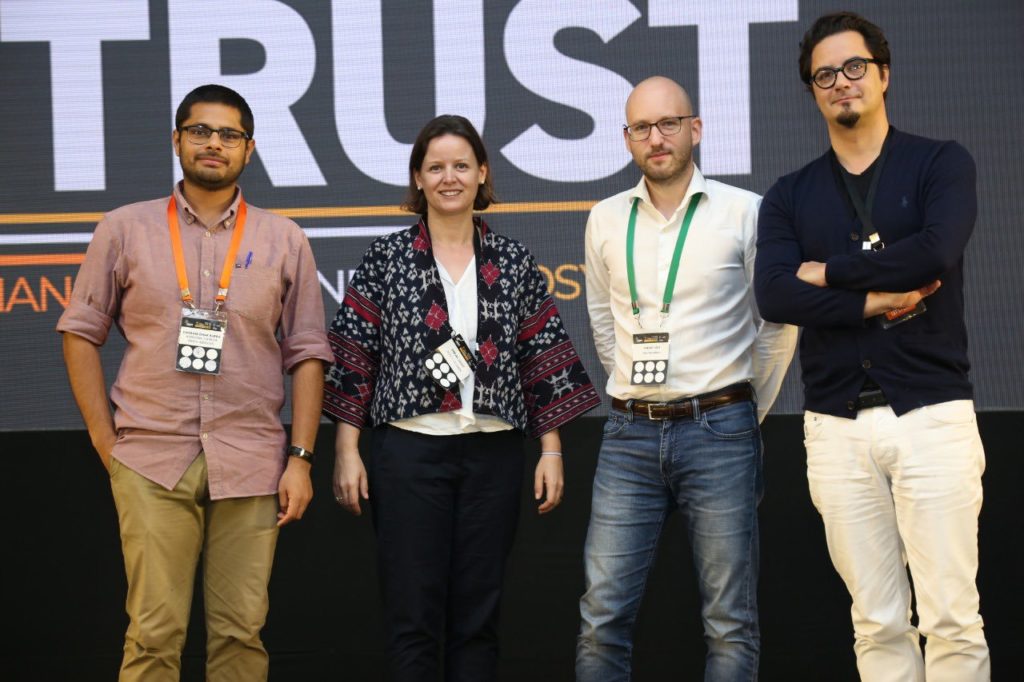
Photo: ThoughtFolks Media. Dharani Dhar Burra, Derval Usher, Simone Sala, and Fred Pivetta pose at “The Un-Convention” session.
PARTNERSHIPS & COLLABORATION
- Research data leaders from five CGIAR Centers and three external partners converged on a vision of good practice throughout the research data lifecycle. By sharing and reviewing technologies and practice across the whole research data lifecycle, we charted a way forward together to data-enable food security research and impacts.
- ICRISAT researchers presented a draft reference architecture for IoT networks for crop improvement and agronomy research, developed with CIAT researchers and the BIG DATA Platform.
- CGIAR and partner engineers presented image processing and analysis pipelines for drone imagery spanning breeding, agronomy, and landscape use-cases.
- The mobile industry association, a mobile operator from Sri Lanka, and IBM/The Weather Company affirmed that there is a significant opportunity to ally with each other and CGIAR on developing new services for climate smart agriculture.
- The BIG DATA Platform and Accenture Development Partnerships presented progress on mapping out a unified information vision for CGIAR and partners.
DISCOVERING & EXAMINING NEW TECH
- Delegates from Google and the University of Cambridge led sessions on how and where to shape the product and research agenda to ensure artificial intelligence services are human-centred while we understand and avert systemic risks to human or food security.
- An array of systems for enabling and intermediating large-scale collective action were examined, including: sustainability games, agent-based modeling linked with remote sensing for watershed management, and machine learning-driven agro-ecological modeling.
- 250 players tested the alpha version of a game simulating the social dilemmas of sustainable management of water resources for farming. The game will be launched on a social media platform to see how it might inform sustainable management of a real water resource.
- Reinforcement learning (a class of machine learning) was introduced as a potential key enhancement to crop models.
- A two hour workshop equipped developers with the skill to build their own blockchains.
PRIVACY, ETHICS & CONSENT
- A legal consultant with the Platform for BIG DATA outlined a new, dynamic approach to informed consent based on ongoing partnership and collaboration with data holders.
- The Minnesota Supercomputing Institute presented work undertaken with the BIG DATA Platform to converge regulatory and ethical frameworks and map them to detailed international standards for data systems for managing sensitive data. We are moving beyond guidelines–useful but by definition very general–to architectures and standards for responsible data in our sector.
- Experts in intellectual property, international treaties on biodiversity, and genetic resources staged a “commons debate” to help elucidate and unpack the complexity of effective stewardship of genetic resources in the age of digital sequences.
- Experts in digital extension examined the depth of the challenge and some key learnings for building ethical, trustworthy digital advisory services.
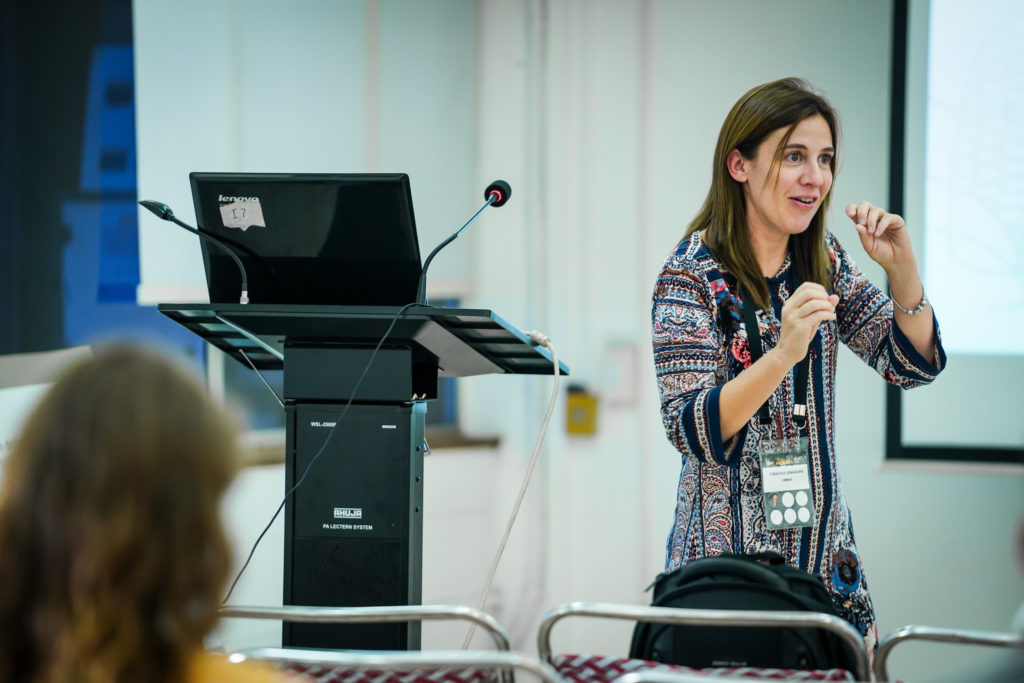
Photo: ThoughtFolks Media. Carolina Paola Sansaloni, High-throughput genotyping and sequencing specialist at CIMMYT, presents during the commons debate on genetic resources, benefits sharing, and dematerialization.
WORKING TOWARDS SDG GOALS
- DATA & GENDER: Gender experts and data scientists working with mobile network metadata, converged on methods for trying to predict and observe changes in women’s economic empowerment at a whole-of-system scale.
- FINANCIAL INCLUSION: Experts examined the opportunities for leveraging the convergence of the world’s largest biometric identification system (Aadhaar), mobile phones, and the world’s largest financial inclusion program (Jan Dhan Yojana) for transforming rural livelihoods.
- DATA & GLOBAL DIETS: A cross-disciplinary panel and a member of the EAT-Lancet Commission and co-author of the 2019 report “Food in the Anthropocene” explored the notion of eating within planetary boundaries, and looked at how the data could be mobilized to examine real diets in global context.
INNOVATION & THE INSPIRE CHALLENGE
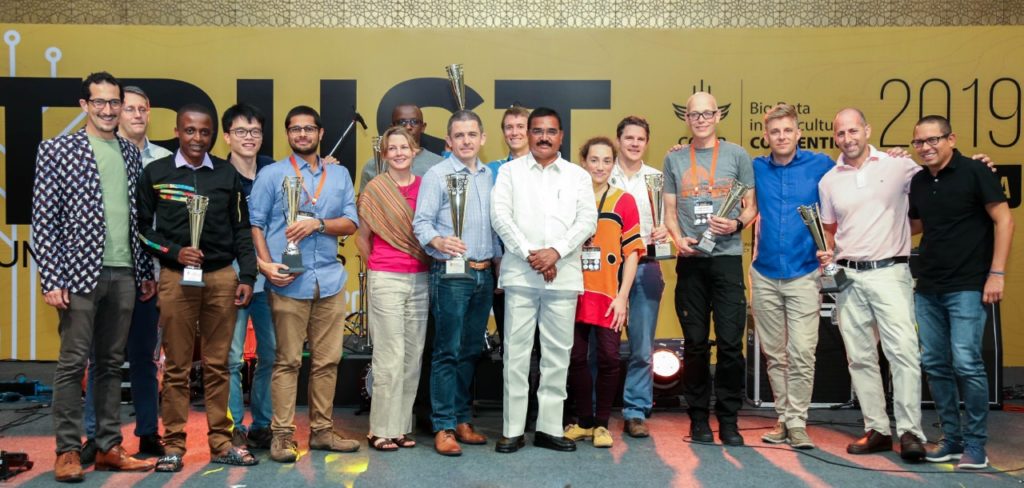
Photo: ThoughtFolks Media. Winners of the 2019 Inspire Challenge.
- Ten stellar projects competed for start-up grants from the CGIAR Inspire Challenge, and four were awarded 100,000 USD each to continue their project.
- Seven teams who had completed startup awards competed for scale-up funds and four were awarded a combined total of 625,000 USD
Last year’s Inspire Challenge scale-up winner “Seeing is Believing” demonstrated how they anonymized cellphone camera images and developed an image processing pipeline to build a living, high-quality dataset from the flow of wheat field images from some 33,000 farmers with mobile phones. - An innovation bazaar buzzed with thirty potential solutions in robotics, remote sensing, applications, and more.
- Legal consultants, innovation managers, and researchers into innovation examined gaps in the agtech startup ecosystem and good practices in setting up digital accelerators for agriculture.
- We are getting better at targeting big data innovation in a few key ways:
- In 2017 less than 10% of proponents proposed to use machine learning on large unstructured data sources, whereas more than 65% of 2018 and 2019 proponents did.
- The percentage of proposals directly targeting small producers (crop and livestock farmers, fisher-folk) has nearly doubled since 2017.
- 2019 saw even more of a shift away from basic research innovation over previous years. In 2019, 69% of proposals were categorized as incremental innovation and disruptive innovation, compared to 21% in 2017. Only 9% of 2019 proposals were considered basic research. Incremental and disruptive innovation tend to have more immediate and widespread impacts in comparison to basic research.
- In 2019, 80% of Inspire Challenge proponents included a gender component, up from 70% in 2018.
November 19, 2019
Brian King
Coordinator
CGIAR Platform for Big Data in Agriculture
Cali, Colombia
Latest news

